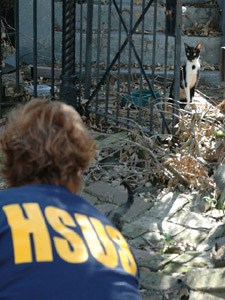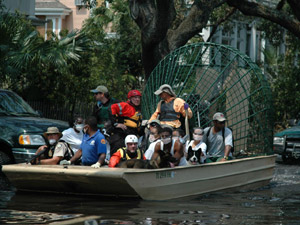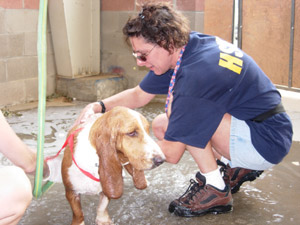|

A Humane Society worker tries to coax a cat to come to her on a New Orleans street. (Photo courtesy of HSUS.)
|
BEVAN: What we’re seeing now is that as we’re working in there you’re finding more animals that have been without food and water, more animals that are packing up, more animals that have tried to survive for the past week. And people are under the mistaken impression that, you know, dogs and cats are going to just revert to their wild nature and take care of themselves. And certainly, you know, you do get some packs of dogs starting, but most just suffer, and they don’t pack up. I have four dogs and four cats, and if it’s not delivered to them they would not know what to do. They’re also suffering because of the heat. Many of them are used to being, you know, sleeping on the bed or the couch, and now they’re outside, they’re confused, they have no food and water, they don’t know where their family is. And so it is a very desperate situation.
CURWOOD: Where do you find them? Are they sitting out on roofs? Where are they?
BEVAN: In some cases. In Mississippi the flood water’s pretty much gone down, so what you’re finding is animals that are roaming, animals that are in the rubble of their former homes, animals that are hiding. Certainly with cats, they’re not going to come out when we call; we’re going to have to trap into areas and try to get those cats out of there. So, you know, horses standing at the side of the road, or maybe even in the road. Cattle, that kind of thing.
So, it’s not so much actually on the rooftop now. Yesterday we did a rescue of a dog that in the storm had actually been washed into somebody’s attic. And the woman returned to go and get her belongings, an elderly woman, and she goes every day and has been shoving food and water up to the attic to feed and water it. But she could not physically lift it down. So our teams were able to go in and actually get the dog out, and it is at our Hattiesburg facility right now.
| |

Animal rescue workers evacuate several dogs from the flooded streets of New Orleans. (Photo courtesy of HSUS.)
CURWOOD: If you’re rescuing animals you’ve got to have had some heartbreakers.
BEVAN: Well, there definitely is. We’re just, you know, when you look at people, and you look at these animals, and they’re so confused and they’re so – you know, like that dog in the attic. It looks like somebody loved that animal. Somebody still probably does love that animal. You look at the animals they’re pulling from those areas, and they’re hungry, and they get in the cages and they collapse in the air-conditioning. They’re just exhausted. They’re hungry. They’re thirsty.
But, you know, we even have the long term issues. We have the people reuniting them with their animals, and that’s a huge issue for us. You know, to me, hearing about the little boy who gets the dog taken from his arms, and he’s screaming, “Snowball.” the people in Mississippi, that is breaking our heart, and we’re not even working in Louisiana. What that tells us is we’re getting down to the coast and we’re working even harder.
CURWOOD: Tell me about a reunification that just warms your heart.
|

A rescued dog gets a bath at a shelter in Hattiesburg, Miss. (Photo courtesy of HSUS.)
|
BEVAN: Well, haven’t had that many here yet. You know, right now we’re doing the rescues, we’re trying to find the people who called in the rescues. I can tell you that one of the things that I was really taken aback is that a man had bred little Miniature Pinschers, an older man, and the building collapsed on them and killed about half. He had about 160. And he could not physically move the structure to get to the other ones. And he got through to his pastor and they prayed that someone would come help him, because nobody could get to him. And one of our teams found the man, drove in, cut their way into him and then cut the animals out of that facility. Put them in new caging, removed some that he would give up for vet care. So they’re okay now, and he believes that they’re his angels. So we’re going to be as much angels as we can and make those reunifications.
CURWOOD: You know, the famous biologist E. O. Wilson says that since we evolved with all the other species, we need to be with them, and in no case does that seem more evident than pets. People are pretty emotionally attached to their animals. What happens in a circumstance like this?
BEVAN: Well, I think what you’ll find in disasters – of course, you had the people that leave animals behind. Of course, you had the people that decide to move on and not keep that pet. But what you also have is those people who that is what is going to get them through this. This is what they need to be okay. It is part of their family. That they don’t know where it is, that they do not know it’s safe, then they are frantic, just as you would, you know, a child. Just as someone would a family member. I can’t stress how important it is to not just the animal’s health and mental health to get it, but to the people who love those animals to take care of them and to get them either back to them, or at least that they know they’re safe somewhere.
CURWOOD: Laura Bevan is head of the U.S. Humane Society’s Katrina Rescue Operations. Laura, thanks for being here.
BEVAN: You’re welcome.
CURWOOD: If you’d like to help people or pets or both in the aftermath of Hurricane Katrina, please go to our website, loe dot org. There you can find a wealth of information about humanitarian amd environmental efforts to respond to the Katrina tragedy. And if there is something you'd like us to know, please write us at comments at loe.org. Once again, comments @ loe.org.
[MUSIC: Townes Van Zandt “If I Needed You” from ‘Best Of…’ (Tomato Records - 2005)]
Living on Earth wants to hear from you!
Living on Earth
62 Calef Highway, Suite 212
Lee, NH 03861
Telephone: 617-287-4121
E-mail: comments@loe.org
Donate to Living on Earth!
Living on Earth is an independent media program and relies entirely on contributions from listeners and institutions supporting public service. Please donate now to preserve an independent environmental voice.
NewsletterLiving on Earth offers a weekly delivery of the show's rundown to your mailbox. Sign up for our newsletter today!
 Sailors For The Sea: Be the change you want to sea. Sailors For The Sea: Be the change you want to sea.
 The Grantham Foundation for the Protection of the Environment: Committed to protecting and improving the health of the global environment. The Grantham Foundation for the Protection of the Environment: Committed to protecting and improving the health of the global environment.
 Contribute to Living on Earth and receive, as our gift to you, an archival print of one of Mark Seth Lender's extraordinary wildlife photographs. Follow the link to see Mark's current collection of photographs. Contribute to Living on Earth and receive, as our gift to you, an archival print of one of Mark Seth Lender's extraordinary wildlife photographs. Follow the link to see Mark's current collection of photographs.
 Buy a signed copy of Mark Seth Lender's book Smeagull the Seagull & support Living on Earth Buy a signed copy of Mark Seth Lender's book Smeagull the Seagull & support Living on Earth
| | |









